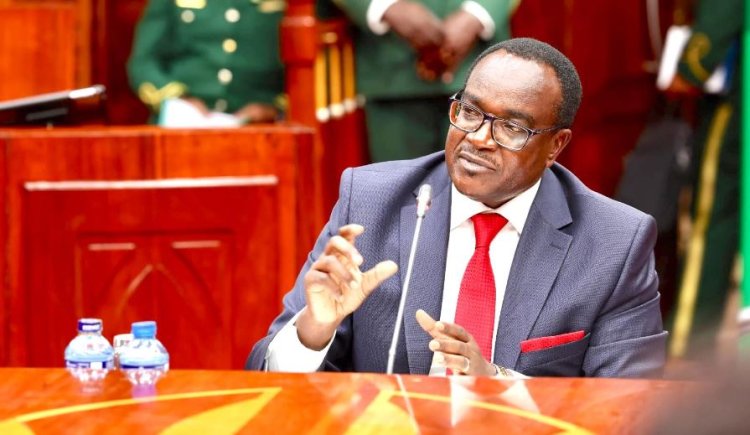Ministry of Education Forms Committees to Revise Higher Education Funding Model
The Ministry of Education forms two committees to review and improve the New Funding Model for Higher Education, addressing concerns from stakeholders and promoting inclusivity and financial sustainability.

The Ministry of Education has officially announced the formation of two specialized working committees tasked with reviewing and improving the New Funding Model for Higher Education. This initiative comes as a direct response to mounting concerns raised by various stakeholders, including students, academic institutions, and education policy experts, who have expressed dissatisfaction with certain aspects of the current funding model. The objective of the review is to ensure that the funding framework becomes more inclusive, efficient, and better aligned with the needs of both students and higher learning institutions.
Cabinet Secretary for Education, Julius Ogamba, emphasized that the formation of these committees is a crucial step towards addressing the numerous concerns surrounding the funding model. He noted that the government is committed to fostering an equitable education system where financial barriers do not hinder students' access to higher education. The revision of the funding model aims to create a more sustainable and transparent system, ensuring that all students—regardless of their socio-economic background—can pursue their educational goals.
Key Objectives of the Committees
The newly formed committees will be responsible for conducting a comprehensive review of the funding model's structure, focusing on several key areas. These include evaluating the current distribution of funds to universities and colleges, assessing the allocation criteria for student scholarships and loans, and examining how well the model supports marginalized groups and regions. Additionally, the committees will explore new funding mechanisms to increase financial sustainability for higher education institutions, many of which have struggled with operational costs due to budgetary constraints.
The government has made it clear that this initiative is not simply a superficial adjustment but a deep and thorough examination of the current system. By engaging a wide range of stakeholders—students, educators, and financial experts—the committees will work to create a funding model that promotes access, affordability, and excellence in higher education.
Calls for Dialogue and Patience
In light of the ongoing reforms, Cabinet Secretary Ogamba has made a public appeal for patience and cooperation from all concerned parties. He has specifically requested the cancellation of demonstrations that were scheduled to take place tomorrow, led by student organizations and some faculty members. These protests were originally planned to draw attention to the perceived inequities in the current funding model, particularly its inability to meet the needs of students from disadvantaged backgrounds.
Ogamba urged all stakeholders to give the committees the necessary time to carry out their review and implement the proposed changes. "We understand the frustrations of students and institutions alike, but it is important to approach this issue constructively. These committees are being formed with the sole purpose of addressing the very concerns that have been raised. We ask that everyone allow the process to unfold, and we remain committed to transparent communication throughout," he said in a public statement.
Next Steps and Anticipated Changes
The two committees are expected to begin their work immediately, with preliminary findings anticipated within the next few months. Their findings will be compiled into a comprehensive report, which will be presented to the Ministry of Education for further evaluation and eventual implementation. As part of their mandate, the committees will also hold consultative forums with key education stakeholders, including university leaders, student unions, and civil society organizations, to gather diverse perspectives on how to best reform the funding model.
One of the anticipated outcomes of the review is a more streamlined system for applying for student loans and grants, aimed at reducing bureaucratic hurdles and ensuring that financial aid reaches the students who need it most. There is also speculation that the committees will recommend an increase in public funding for universities, many of which have faced significant financial difficulties in recent years.
Commitment to Transparency
The Ministry of Education has pledged to maintain a high level of transparency throughout the review process. Periodic updates will be provided to keep the public informed of the committees' progress. This commitment to openness has been welcomed by students and institutions, many of whom have called for greater involvement in the decision-making process affecting higher education.
As the committees commence their review, stakeholders are hopeful that the upcoming changes will address long-standing issues within the funding model and set a new standard for fairness and accessibility in higher education.
Conclusion
The formation of these committees marks a significant step towards creating a more equitable and effective funding system for higher education in the country. By taking into account the voices of all stakeholders and committing to a thorough review, the Ministry of Education is signaling its dedication to resolving the current challenges and improving the overall quality of education. As the process unfolds, students, educators, and institutions alike will be closely monitoring the progress, hopeful for meaningful reforms that will shape the future of higher education.
Further updates will be shared as the committees progress with their work, and the Ministry encourages ongoing dialogue to ensure the successful implementation of these much-needed improvements.
What's Your Reaction?



















